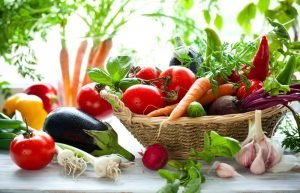Introduction
Heartburn and Gastroesophageal Reflux Disease (GERD) are common conditions that can significantly affect quality of life. Choosing the right foods can play a crucial role in managing these conditions and alleviating symptoms. This article explores which foods can help ease heartburn and fight GERD, while also providing practical meal ideas and tips for a GERD-friendly diet.
Understanding Heartburn and GERD
What is Heartburn?
Heartburn is a burning sensation in the chest or throat caused by acid reflux. It occurs when stomach acid flows back into the esophagus, irritating its lining. Common triggers include spicy foods, fatty foods, and large meals.
What is GERD?
Gastroesophageal Reflux Disease (GERD) is a chronic condition where acid reflux occurs frequently, leading to more severe symptoms and potential damage to the esophagus. GERD can cause persistent heartburn, regurgitation, and discomfort.
Symptoms of Heartburn and GERD
Typical symptoms include:
- Heartburn: A burning sensation in the chest or throat.
- Regurgitation: A sour or bitter taste in the mouth.
- Chest Pain: Discomfort that can be mistaken for a heart issue.
- Difficulty Swallowing: A sensation of food getting stuck.
Foods That Help Alleviate Heartburn and GERD Symptoms
Non-Citrus Fruits
Fruits like bananas and apples are gentle on the stomach and help neutralize stomach acid. Bananas coat the stomach lining, while apples provide a soothing effect, reducing the risk of acid reflux.
Vegetables
Vegetables such as spinach, broccoli, and green beans are low in fat and high in fiber, which helps absorb excess stomach acid. They also promote overall digestive health, reducing GERD symptoms.
Whole Grains
Whole grains like oatmeal, brown rice, and whole-wheat bread are excellent choices. They are rich in fiber, which helps absorb stomach acid and promote healthy digestion.
Lean Proteins
Lean meats such as chicken, turkey, and fish are less likely to trigger acid reflux compared to fatty cuts of meat. These proteins are easier to digest and help maintain a balanced diet.
Ginger
Ginger is known for its anti-inflammatory properties and ability to soothe the digestive tract. Incorporating ginger into your diet, whether through tea or as a spice, can help reduce inflammation and ease symptoms.
Foods to Avoid
Spicy Foods
Spicy foods can irritate the esophagus and exacerbate heartburn. Ingredients like chili peppers and hot sauces can trigger symptoms and should be avoided.
Citrus Fruits
Fruits such as oranges, lemons, and tomatoes are acidic and can increase stomach acid production. It’s best to avoid these fruits if you are prone to GERD.
High-Fat Foods
Foods high in fat, such as fried foods, full-fat dairy products, and fatty meats, can slow down digestion and increase the risk of reflux. Opt for low-fat alternatives to help manage symptoms.
Chocolate and Caffeine
Chocolate and caffeinated beverages, like coffee and soda, can relax the lower esophageal sphincter, allowing stomach acid to escape into the esophagus. Limiting these items can help reduce GERD symptoms.
Meal and Snack Ideas
Breakfast
Start your day with GERD-friendly options such as oatmeal topped with non-citrus fruit, or whole-grain toast with a mild spread like almond butter.
Lunch
A grilled chicken salad with mixed greens, cucumbers, and a mild vinaigrette is a satisfying and soothing option. Avoid adding spicy dressings or heavy cheeses.
Dinner
Opt for baked fish with steamed vegetables like broccoli and carrots. Serve with a side of brown rice or quinoa for a balanced and gentle meal.
Snacks
Healthy snacks include whole-grain crackers with hummus, or a small apple with a handful of almonds. These choices are easy on the stomach and help manage hunger without aggravating GERD.
Tips for Managing GERD Through Diet
Portion Control
Eating smaller, more frequent meals rather than large portions can help reduce the pressure on the stomach and lower the risk of reflux.
Avoid Eating Before Bed
Try to finish your last meal at least 2-3 hours before lying down. This gives your stomach time to digest and reduces the chance of nighttime symptoms.
Hydration
Drinking plenty of water throughout the day helps dilute stomach acid and supports overall digestion. However, avoid drinking large amounts of water during meals to prevent increased stomach pressure.
Lifestyle Changes to Complement Dietary Choices
Maintaining a Healthy Weight
Excess weight can put pressure on the stomach and increase the risk of GERD. Maintaining a healthy weight through a balanced diet and regular exercise can help manage symptoms.
Elevating the Head While Sleeping
Elevating the head of your bed by 6-8 inches can help prevent nighttime reflux by keeping stomach acid from flowing back into the esophagus while you sleep.
Avoiding Tight Clothing
Wearing loose-fitting clothing can reduce pressure on the abdomen and decrease the likelihood of acid reflux.
Conclusion
Incorporating heartburn-easing and GERD-fighting foods into your diet can significantly impact symptom management and improve your quality of life. By understanding which foods to include and avoid, you can create a meal plan that supports digestive health and alleviates discomfort.
Call to Action
Share your experiences with managing heartburn and GERD through diet in the comments below. Follow our blog for more health and nutrition tips to help you live your best life!

